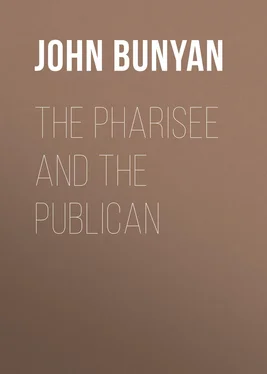John Bunyan - The Pharisee and the Publican
Здесь есть возможность читать онлайн «John Bunyan - The Pharisee and the Publican» — ознакомительный отрывок электронной книги совершенно бесплатно, а после прочтения отрывка купить полную версию. В некоторых случаях можно слушать аудио, скачать через торрент в формате fb2 и присутствует краткое содержание. Жанр: foreign_prose, foreign_religion, Философия, foreign_psychology, foreign_antique, на английском языке. Описание произведения, (предисловие) а так же отзывы посетителей доступны на портале библиотеки ЛибКат.
- Название:The Pharisee and the Publican
- Автор:
- Жанр:
- Год:неизвестен
- ISBN:нет данных
- Рейтинг книги:4 / 5. Голосов: 1
-
Избранное:Добавить в избранное
- Отзывы:
-
Ваша оценка:
- 80
- 1
- 2
- 3
- 4
- 5
The Pharisee and the Publican: краткое содержание, описание и аннотация
Предлагаем к чтению аннотацию, описание, краткое содержание или предисловие (зависит от того, что написал сам автор книги «The Pharisee and the Publican»). Если вы не нашли необходимую информацию о книге — напишите в комментариях, мы постараемся отыскать её.
The Pharisee and the Publican — читать онлайн ознакомительный отрывок
Ниже представлен текст книги, разбитый по страницам. Система сохранения места последней прочитанной страницы, позволяет с удобством читать онлайн бесплатно книгу «The Pharisee and the Publican», без необходимости каждый раз заново искать на чём Вы остановились. Поставьте закладку, и сможете в любой момент перейти на страницу, на которой закончили чтение.
Интервал:
Закладка:
John Bunyan
The Pharisee and the Publican
Two men went up into the temple to pray ; the one a Pharisee , and the other a Publican . The Pharisee stood and prayed thus with himself ; God , I thank thee , that I am not as other men are , extortioners , unjust , adulterers , or even as this Publican . I fast twice in the week , I give tithes of all that I possess . And the Publican , standing afar off would not lift up so much as his eyes unto heaven , but smote upon his breast , saying , God be merciful to me a sinner .—Luke, xviii. 10–13.
In the beginning of this chapter you read of the reason of the parable of the unjust judge and the poor widow; namely, to encourage men to pray. “He spake a parable to this end, that men ought always to pray, and not to faint;” and a most sweet parable for that purpose it is: for if through importunity, a poor widow woman may prevail with an unjust judge, and so consequently with an unmerciful and hard-hearted tyrant, how much more shall the poor, afflicted, distressed, and tempted people of God, prevail with, and obtain mercy at the hands of, a loving, just, and merciful God? The unjust judge would not hearken to, nor regard the cry of, the poor widow, for a while: “But afterward he said within himself, Though I fear not God, nor regard man; yet because this widow troubleth me, I will avenge her, lest by her continual coming she weary me.” “Hark,” saith Christ, “what the unjust judge saith.” “And shall not God avenge his own elect, which cry day and night unto him?—I tell you that he will avenge them speedily.”
This is therefore a very comfortable parable to such of the saints as are under hard usage by reason of evil men, their might and tyranny: for by it we are taught to believe and expect, that God, though for a while he seemeth not to regard, yet will, in due time and season, arise and set such in safety from them that puff at them; Psalm xii. 4.
Let the good Christian pray always; let him pray, and not faint at seeming delays; for if the widow by importunity prevailed with the unjust judge, how much more shall he with his heavenly Father. “I tell you,” says Christ, “that he will avenge them speedily.”
But now, forasmuch as this parable reacheth not (so directly) the poor Publican in the text, therefore our Lord begins again, and adds to that other parable, this parable which I have chosen for my text; by which he designeth two things: First, The conviction of the proud and self-conceited Pharisee: Secondly, The raising up and healing of the cast down and dejected Publican. And observe it, as by the first parable he chiefly designeth the relief of those that are under the hands of cruel tyrants, so by this he designeth the relief of those that lie under the load and burden of a guilty and disquieted conscience.
This therefore is a parable that is full of singular comfort to such of the sinners in the world that are clogged with guilt and sense of sin; and that lie under the apprehensions of, and that are driven to God by the sense of the judgment that for sin is due unto them.
In my handling of this text, I shall have respect to these things—
1. To the persons in the text.
2. To the condition of the persons in the text.
3. To the conclusion that Christ makes upon them both.
First , For the persons. They were, as you see, far one from another in their own apprehension of themselves; one good, the other bad; but yet in the judgment of the law, both alike, both the same, both sinners; for they both stood in need of mercy. True, the first mentioned did not see it, as the other poor sinner did; but that altereth not the case: he that is in the judgment of the law a sinner, is in the judgment of the law for sin condemned, though in his own judgment he be ever so righteous.
Men must not be judged, or justified, according to what themselves do think, but according to the verdict and sentence that cometh out of the mouth of God about them. Now, the sentence of God is, “All have sinned:” “There is none righteous, no, not one;” Rom. iii. It is no matter, then, what the Pharisee did think of himself; God by his word hath proclaimed him a sinner: a sinner, by reason of original sin; a sinner, by reason of actual transgression. Personally, therefore, with reference to the true nature of their state, they both were sinners, and both by the law under condemnation. True, the Publican’s leprosy was outward; but the Pharisee’s leprosy was inward: his heart, his soul, his spirit, was as foul, and had as much the plague of sin, as had the other in his life or conversation.
Secondly , As to their conditions (I do not mean by condition, so much a habit of mind, as the state that they had each of them put themselves into by that mind.) “The one,” says the text, “was a Pharisee, the other a Publican.” A Pharisee: that is, one that hath chosen to himself such a course of life. A Publican: that is, one that hath chosen to himself such a course of life. These terms, therefore, shew the divers courses of life that they had put themselves into. The Pharisee, as he thought, had put himself into a condition for heaven and glory; but the Publican was for this world and his lusts. Wherefore when the Pharisee stands in the temple, he boasteth of himself and good condition, but condemneth the Publican, and bitterly inveigheth against him. But, as I said, their personal state, by the law, was not at all changed. The Pharisee made himself never the better; the Publican also abode in his place.
Indeed the Publican is here found to recant, and repent of his condition, and of the condition that he had put himself into; and the Pharisee to boast of his. But the Publican’s repentance was not of himself, but of God, who can also, yea, and sometimes it is evident (Acts ix.) he doth, make Pharisees also repent of that condition that they have chosen to be in themselves; Phil. iii. 3–8. The Pharisee, therefore, in commending of himself, makes himself never the better; the Publican also, in condemning of himself, makes himself never the worse. Nay, contrariwise, the Pharisee, by commending of himself, makes himself much the worse, ver. 14; and the Publican, by condemning of himself, makes himself much the better. “I tell you (says Christ) this man went down to his house justified rather than the other; for every one that exalteth himself shall be abased: and he that humbleth himself shall be exalted.”
But, I say, as to men’s commending of themselves, yea, though others should commend them also, that availeth, to God-ward, nothing at all. “For not he that commendeth himself is approved, but whom the Lord commendeth.” So then, men in “measuring themselves by themselves, and comparing themselves among themselves, are not wise;” 2 Cor. x. 12.
Now, this was the way of the Pharisee; I am not, saith he, as other men: I am no extortioner, nor unjust, no adulterer, nor yet as this Publican.
“Two men went up into the temple to pray;” and they two, as I said, as opposite one to the other, as any two men that ever went thither to pray. One of them was over righteous, and the other wicked over much. Some would have thought, had they not by the word of Christ been otherwise described, that they had been both of the same religion; for they both went up into the temple to pray; yea, both to pray, and that at the same time, as if they did it by appointment, by agreement; but there was no such thing. The one was a Pharisee, the other a Publican: for so saith the after words: and therefore persons as opposite as light and darkness, as fire and water; I mean, as to their apprehensions one of another. The Pharisee could not abide the Publican, nor could the Publican brook the Pharisee; and yet both went up into the temple to pray. It is strange to see, and yet it is seen, that men cross in their minds, cross in their principles, cross in their apprehensions; yea, and cross in their prayers too, should yet meet together in the temple to pray.
Читать дальшеИнтервал:
Закладка:
Похожие книги на «The Pharisee and the Publican»
Представляем Вашему вниманию похожие книги на «The Pharisee and the Publican» списком для выбора. Мы отобрали схожую по названию и смыслу литературу в надежде предоставить читателям больше вариантов отыскать новые, интересные, ещё непрочитанные произведения.
Обсуждение, отзывы о книге «The Pharisee and the Publican» и просто собственные мнения читателей. Оставьте ваши комментарии, напишите, что Вы думаете о произведении, его смысле или главных героях. Укажите что конкретно понравилось, а что нет, и почему Вы так считаете.












